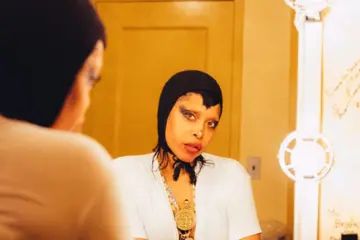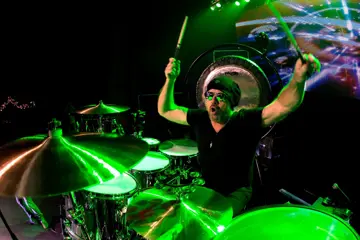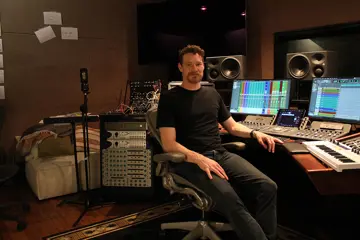The Melbourne International Film Festival has unveiled its full program for 2014. For a fest so vast in both size (341 films!) and scope (52 countries!), the 63rd MIFF has a distinctly local feeling.
Opening night film Predestination is a time-travel thriller starring Ethan Hawke that was shot in local studios, but Melbourne is a character unto itself in closing night film Felony, in which local filmmaker Matthew Saville mounts a tense police-thriller - starring Joel Edgerton, Tom Wilkinson, Jai Courtney, and Melissa George - against the city's inner West.

Ethan Hawke in Predestination.
Also filmed on local streets is MIFF's Centrepiece Gala, Cut Snake, a '70s-set and inspired revenge-thriller that finds Tony Ayres directing Sullivan Stapleton, Alex Russell, and Jessica De Gouw. There's also a mini-program called Melbourne Stories, a four-film strain that includes Curtain Call, Justin Olstein's documentary chronicle of the dying days of Malvern's children's-pantomime theatre, the Tivoli, and Mike Brook's study of local rock'n'roll raconteur Stephen Cummings, Don't Throw Stones.
Films that received development from MIFF's Premiere Fund also include Stephen Lance's My Mistress, an S&M-themed drama starring French screen icon Emmanuelle Béart; Ian Pringle's crime-thriller The Legend Maker, which bounces between Melbourne and Crete; and Mark Hartley's latest rummage through the archives of exploitation-movie history, Electric Boogaloo: The Wild, Untold Story Of Cannon Films.
Don't miss a beat with our FREE daily newsletter
Also screening amongst MIFF's Australian Showcase are a pair of local 2014 standouts that head to foreign frontiers: Ukraine Is Not A Brothel finding documentarian Kitty Green spending a year-and-a-half living with topless performance-art protestors Femen, and finding dark patriarchal truths behind their lipstick-feminist façade; Ruin following Melbourne's Amiel Courtin-Wilson - Australian cinema's most interesting auteur - to Cambodia, making a “Badlands down the Mekong” tail of lovers-on-the-lam that's a profound piece of pure cinema.
The most intriguing of MIFF 2014's 17 program strains is Celluloid Dreams: Films Shot On Film, a tribute to the dying pre-digital format that features a wild variety of works united solely by emulsion. Films - and we use the word literally - include American indie comedies (Joe Swanberg's Anna Kendrick-starring Happy Christmas; Alex Ross Perry's Jason Schwartzman-starring Listen Up Philip) and profound pieces of minimalist ethnographic cinema (Ben Russell and Ben Rivers' A Spell To Ward Off The Darkness; the Harvard Sensory Ethnography Laboratory's transcendent Manakamana), as well as Alexei German's posthumous, pus-oozing sci-fi opus Hard To Be A God, a flatulent three-hour black-and-white fever-dream that plays like Russian Ark dunked in a septic tank.

The 400 Blows.
MIFF's retrospective programs highlight French nouvelle-vague heart-throb Jean-Pierre Leaud, with eight films spanning from his youthful debut in François Truffaut's classic The 400 Blows, to his turn as director-on-the-verge-of-losing-it in Olivier Assayas's awesome Irma Vep. There's also A Perfect Midnight: Haunted Hong Kong, a six-film collection of genre pics from the isle built around the two-part Mid-Nightmare from 1962/'63; and a five-film selection of '60s Italian knee-slappers, Commedia All'Italiana.
The Masters & Restorations strain dusts off a run of rarely-screened '70s films, from William Friedkin's suspense-thriller Sorcerer, to African-cinema epoch Touki Bouki, Saul Bass's sole directorial work Phase IV, and Volker Schlöndorff's Baal, a made-for-TV Brecht adaptation previously broadcast only in West Germany in 1970, and starring Neuer Deutscher Film icons Rainer Werner Fassbinder, Margarethe von Trotta, and Hanna Schygulla.
There's also a host of cinephile-friendly documentaries, including Frank Pavich's acclaimed cinematic what-if, Jodorowsky's Dune; Richard Misek's critical cine-essay Rohmer In Paris; the Swedish think-piece Trespassing Bergman, which invites filmmakers (including Claire Denis and Michael Haneke) into the late Swedish legend's home; Steve James' portrait of Roger Ebert, Life Itself; and Gabe Klinger's ball-tossing conversation-piece Double Play: James Benning And Richard Linklater.
Linklater's ultra-ambitious, 12-years-in-the-making drama Boyhood is one of the highlights of MIFF's International Panorama, a narrative-feature catch-all which ends up holding so many of 2014's cinema standouts. Like Catherine Breillat's pained memoir Abuse Of Weakness; Sergio Caballero's beautiful, brutal portrait of long-distance-love-via-Skype, 10.000km; Steven Knight's Tom Hardy-starring one-man-in-a-car, real-time thriller Locke; Lukas Moodysson's bananas-fun teen-punk barney We Are The Best!; and the singular, bizarre visions of Shahram Mokri's Fish & Cat, Benedikt Erlingsson's Of Horses And Men, David Wnendt's Wetlands, and Denis Côté's The Joy Of Man's Desiring.

10.000km.
International Panorama also plays host to new, direct-from-Cannes works from legendary auteurs, with Jean-Luc Godard's Goodbye To Language 3D, the Dardenne Bros' Two Days, One Night, and Life Of Riley, the final film from the late Alain Resnais. And then there's Zach Braff's crowdfunded Garden State sequel, Wish I Was Here, which shows even MIFF can program genuine crap.
The ever-popular Backbeat strain brings piles of documentaries on a host of beloved musical figures, from heavy-hitters like Nick Cave (20,000 Days On Earth), Jarvis Cocker (Pulp: A Film About Life, Death & Supermarkets), Elliott Smith (Heaven Adores You) and Nas (Time Is Illmatic), to cult figures like Silver Mt. Zion (Come Worry With Us!), Slint (Breadcrumb Trail), and Edwyn Collins (The Possibilities Are Endless). There's also the directorial debut of Belle & Sebastian frontman Stuart Murdoch, the whimsical musical God Help The Girl, and John Ridley's Jimi: All Is By My Side, a Jimi Hendrix biopic starring André Benjamin of OutKast.
The Documentaries program boasts Errol Morris's interview with W. Bush-era warmonger Donald Rumsfeld, The Unknown Known; Joe Berlinger's incandescent piece of court-case journalism, Whitey: United States v. James J. Bulger; Martin Scorsese's tribute to the New York Review Of Books, The 50 Year Argument; and two more portraits of institutions from the ever-prolific, profound Frederick Wiseman, At Berkeley and National Gallery.

We Are Mari Pepa.
I Dream Of Genius collects docs themed around science and technology, including Todd Miller's Dinosaur 13, Mark Levinson's Particle Fever, and Joerg Burger's Focus On Infinity. India In Flux: Living Resistance is a program of pictures that peer beyond the bright façade of life-in-India exported by Bollywood, with brilliant depictions of grim lives in Children Of The Pyre and My Name Is Salt.
Returning, as always, are MIFF's youth-friendly Next Gen section (whose highlights include Mexican teen-rockband riff We Are Mari Pepa, Julie Bertuccelli's achingly-beautiful documentary The School Of Babel, and Jean Denizot's The Good Life, all of which are just great cinema, no matter your age), Animation (starring Michel Gondry's sweet Noam Chomsky conversation-piece Is The Man Who Is Tall Happy? and Studio Ghibli's The Tale Of Princess Kaguya), and Accent On Asia (which includes Wong Kar-wai's The Grandmaster, Naomi Kawase's Still The Water, and two new films from the truly-great Tsai Ming-liang, Stray Dogs and Journey To The West).
Finally, fans of the small-screen can get a taste of it on the big, with the movie-length pilot of Danny Boyle's wild police satire Babylon, four episodes of Emily Mortimer's fictionalised self-mockery Doll & Em, two episodes of the newly-minted made-for-TV companion to Fred Schepisi's Australian cinema landmark The Devil's Playground, and, fresh from Cannes, the unlikely television debut of ascetic French auteur Bruno Dumont, the mini-series Li'l Quinquin.

Stray Dogs.
All of this takes over the Melbourne CBD from Thursday 31 July to Sunday 17 August. Once again, MIFF's home will be at the Forum on Flinders Street, and movies will again screen at ACMI, the Kino, and Melbourne Central, with special events at IMAX and the Melbourne Planetarium. But, following the closure of its recent screening workhorse, Russell Street cinemas, the fest will return to two theatres from MIFF's dark, dark past: the Capitol on Swanston and the Treasury Theatre behind the Parliament building on Spring Street.















